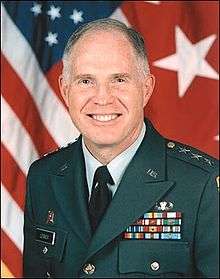
Three-star General William Lennox, born and raised in Yonkers
By Mary Hoar, City of Yonkers Historian, President Emerita Yonkers Historical Society, recipient of the 2004 Key to History, Member of the Yonkers Landmarks Preservation Board, and President Untermyer Performing Arts Council
Monday, June 5th
June 5, 1918: Charles Easton, President of the Yonkers Board of Education, signed contracts with the US War Department to train 200 soldiers at Saunders Trades School during the summer! The men would not only learn their “soldierly duties,” they would receive eight hours training daily to learn special trades. At the end of the summer, the school turned out machinists, gas engine repairmen, carpenters, plumbers and pipe fitters.
June 5, 1946: The New York Central Railroad released a booklet featuring the historic significance of (Philipse) Manor Hall. Besides the history of the manor and the Hall, the brochure mentioned the box hedge “descended” from the original box hedge planted by Frederick Philipse, thanks to cuttings propagated from the original hedge by Boyce Thompson Institute; cedars brought from Washington’s birthplace, Wakefield, Virginia; and the Hall’s special elm tree. The elm was grown from a cutting of a tree at Wellesley College, the very tree where Washington assumed command of the Continental Army.
Tuesday, June 6th:
June 6, 1938: The Westchester County Board of Supervisors accepted the baseball challenge of the Yonkers Common Council! Chairman McClelland appointed a committee of two Supervisors—Democrat James Egan of Yonkers and Republican John Downing of Yorktown– to make arrangements and “keep score.” Besides keeping score, the Supervisors wanted to pick the umpire and propose training rules. Egan suggested the game be played at Tibbetts Brook Park on a weekend, and asked people call him with suggestions to “keep the game safe for democracy.
June 6, 1943: Margaret Quinlan of Truman Avenue received word notified her son, Staff Sergeant John Quinlan, tail gunner on the famous Flying Fortress “Memphis Belle,” was notified the bomber was flying across the Atlantic with the crew to sell war bonds. The Belle was the first American bomber to return home from European Theater under its own power.
Wednesday, June 7th
June 7, 1910: After Mayor James Lennon discovered the Burns Bill prohibited the Trolley on South and North Broadway, he found Yonkers didn’t have the right to grant the original South Broadway franchise in 1907! Continuous digging found a section in the bill stated if a railroad line had been operating for one year “without interference by the authorities or the abutting property owners,” it was understood to be “presumptive evidence” consents were given and the railroad could operate without restrictions, even if violating franchise requirements.
June 7, 1923: Almost every worker in the Water Department was needed to repair the leak in the water main under Jackson Street. Discovered late in the afternoon, the break had flooded the street by the time Superintendent Harry Foley arrived. Shortly after Foley got out of his car to assess the situation, he saw his car sinking! Almost 150 feet of Jackson Street had given way. Six truckloads of ashes from Otis Elevator Company were used to fill the massive hole before resurfacing the street…. and multiple jacks were used to get Foley’s car out!
Thursday, June 8th
June 8, 1924: A grave on Main Street, just below Riverdale Avenue near the new telephone building, was unearthed by workers repairing the road. Unidentified remains of an early settlers in Yonkers and an Indian tomahawk were found.
June 8, 2001: Yonkers native Lieutenant General William Lennox, Jr., assumed duties as the 56th Superintendent of the United States Military Academy, West Point
Friday, June 9th
June 9, 1939: Frank Love of Hawthorne Avenue oversaw the railroad’s guard for King George VI and Queen Elizabeth when they entered the United States at Niagara Falls on the royal train.
June 9, 1943: Columbia University’s Thomas Briggs, former trustee of the Yonkers Board of Education, published a book for high schools called My Part In This War, subtitled “Helping on the Home Front.” Not only did it describe our nation’s wartime economic program, it explained topics such as inflation, rationing, price control, and national conservation; it also explained how young people could help make the war effort successful.
Saturday, June 10th
June 10, 1938: Addressing a Crestwood conference, former Public Safety Commissioner William Cameron stated more than 40 percent of Yonkers motorists were “immune against penalties for traffic law violations,” stating “ticket fixing is a vicious practice by which politicians swap lives for votes.” He added, “Most ticket fixing is not done through the judges but through city officials… many persons hold office because of their willingness to fix tickets.”
June 10, 1939: Thirteen-year-old Girls Scouts Shirley Coles of Palmer Road and Kay Jones of Crestwood met King George and Queen Elizabeth at the World’s Fair! The girls were part of the Scouts Guard of Honor for Their Majesties on the platform at the Federal Building. Scouts were chosen for their good qualities… and had to be about the same height.
Sunday, June 11th
June 11, 1938: Yonkers Mayor Joseph Loehr and New York City Mayor Fiorello La Guardia were designated official umpires for the July baseball game between the Councils for the two municipalities; the game, scheduled for July, was to be played at Travers Island. City Hall buzzed with rumors of our Aldermen quietly practicing running and sliding at Sullivan’s Oval.
June 11, 1942: Former Mayor William Wallin told the Yonkers War Council the Aldermen’s appropriation of $1500 to purchase gifts for departing servicemen was “wholly unconstitutional” and asked them to go on record against the Council’s appropriation since it violated the NYS Constitution. They didn’t. The Council had voted the funding after Samuel Hayward, Chairman of the Yonkers Service Clubs Committee who originally sponsored the sendoff gifts, had run out of money.
Questions or comments? Email YonkersHistory1646@gmail.com. For information on the Yonkers Historical Society, Sherwood House and upcoming events, please visit our website www.yonkershistoricalsociety.org, call 914-961-8940 or email info@yonkershistoricalsociety.org





